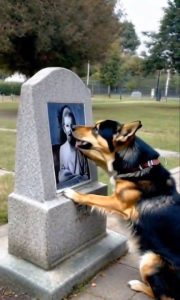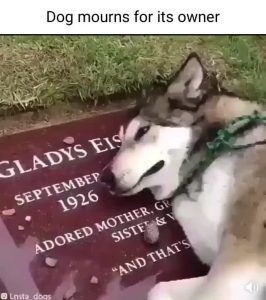The Goodbye That Was Never Spoken

They say dogs don’t understand death. That they live in the moment, that they forget quickly, that their memories don’t linger the way ours do. But then you see something like this — a dog standing quietly at a gravestone, staring at a photo etched in black and white, nudging it gently with his nose like he’s asking, “Why haven’t you come home yet?” — and suddenly, every belief you had about animals and emotions begins to unravel. This isn’t confusion. It’s grief. Quiet, powerful, heartbreaking grief.

He doesn’t cry the way we do. There are no tears. No flowers left behind. No speeches, no trembling goodbyes. But he mourns. He mourns in the way he stays. In the way he presses his face against the stone. In the way he doesn’t understand where the scent went, or why the arms that once held him don’t reach out anymore. This wasn’t just a pet-owner relationship. This was deeper — this was his person. The one who shared lazy mornings and long walks. The one whose voice meant food, fun, comfort, safety, everything. The one he waited for at the door every day. And now, though the door never opens, he’s still waiting. Only now, he waits at a grave.

You can see it in the stillness of his body — not frozen in fear, but heavy with sorrow. In the tilt of his head. In the way he lingers, long after everyone else has left. He doesn’t understand funerals or obituaries. He doesn’t need to. Dogs grieve differently, but they grieve just the same. They don’t need candles or rituals. Their grief isn’t expressed through words. It’s shown through presence. Through loyalty. Through an unspoken ache that says, “You were everything to me, and I don’t know how to move on.”

People often say that dogs are loyal while we’re alive — but I think it’s more than that. I think their loyalty stretches beyond the edge of life itself. Because while we talk about souls and heavens, dogs don’t theorize. They just come back. They return to where the love was. They stay rooted in the places that felt safe. They don’t forget. And perhaps that’s the most sacred kind of love there is — not the kind that ends with a last breath, but the kind that keeps showing up even when there’s no one left to open the door.












